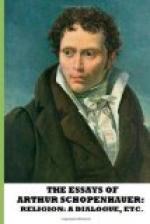also the Edinburg Review, Oct.-Jan., 1836-7.]
The power of religious dogma, when inculcated early,
is such as to stifle conscience, compassion, and finally
every feeling of humanity. But if you want to
see with your own eyes and close at hand what timely
inoculation will accomplish, look at the English.
Here is a nation favored before all others by nature;
endowed, more than all others, with discernment, intelligence,
power of judgment, strength of character; look at them,
abased and made ridiculous, beyond all others, by their
stupid ecclesiastical superstition, which appears
amongst their other abilities like a fixed idea or
monomania. For this they have to thank the circumstance
that education is in the hands of the clergy, whose
endeavor it is to impress all the articles of belief,
at the earliest age, in a way that amounts to a kind
of paralysis of the brain; this in its turn expresses
itself all their life in an idiotic bigotry, which
makes otherwise most sensible and intelligent people
amongst them degrade themselves so that one can’t
make head or tail of them. If you consider how
essential to such a masterpiece is inoculation in the
tender age of childhood, the missionary system appears
no longer only as the acme of human importunity, arrogance
and impertinence, but also as an absurdity, if it
doesn’t confine itself to nations which are still
in their infancy, like Caffirs, Hottentots, South
Sea Islanders, etc. Amongst these races
it is successful; but in India, the Brahmans treat
the discourses of the missionaries with contemptuous
smiles of approbation, or simply shrug their shoulders.
And one may say generally that the proselytizing efforts
of the missionaries in India, in spite of the most
advantageous facilities, are, as a rule, a failure.
An authentic report in the Vol. XXI. of the Asiatic
Journal (1826) states that after so many years of
missionary activity not more than three hundred living
converts were to be found in the whole of India, where
the population of the English possessions alone comes
to one hundred and fifteen millions; and at the same
time it is admitted that the Christian converts are
distinguished for their extreme immorality. Three
hundred venal and bribed souls out of so many millions!
There is no evidence that things have gone better
with Christianity in India since then, in spite of
the fact that the missionaries are now trying, contrary
to stipulation and in schools exclusively designed
for secular English instruction, to work upon the
children’s minds as they please, in order to
smuggle in Christianity; against which the Hindoos
are most jealously on their guard. As I have
said, childhood is the time to sow the seeds of belief,
and not manhood; more especially where an earlier faith
has taken root. An acquired conviction such as
is feigned by adults is, as a rule, only the mask
for some kind of personal interest. And it is
the feeling that this is almost bound to be the case
which makes a man who has changed his religion in




